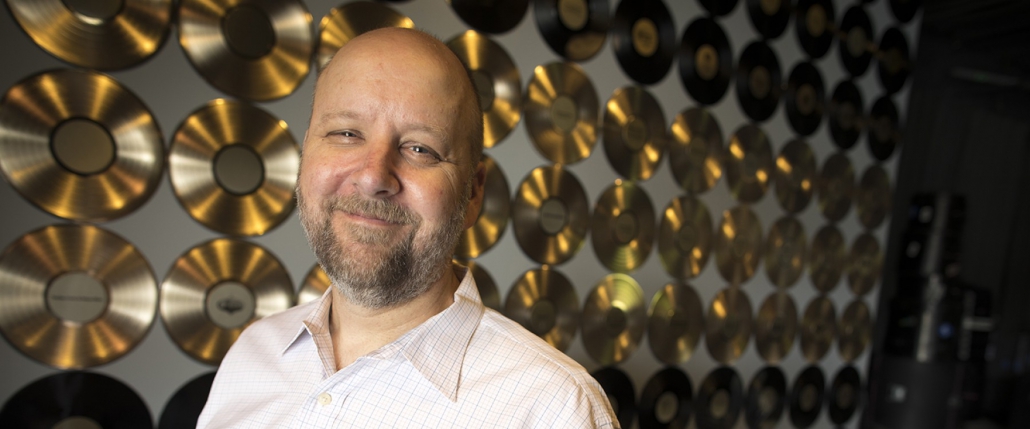The Jerry Tanner Show, Episode 7 – Kentucky
Welp.
Jerry looks at last weekend’s debacle, then previews this Saturday, when the Dawgs will try to pick up the pieces against Kentucky.
Register for Cookies & Cocoa with Hairy Dawg by going to alumni.uga.edu/women and clicking on the event link.
Jerry Tanner is everyone you’ve ever met at a UGA tailgate, everyone who’s ever talked about Georgia football by your cubicle, and every message board poster who claims to have a cousin who cut Vince Dooley’s grass. He’s a UGA alumnus, he’s a college football fanatic with a Twitter addiction, and he’s definitely a real person and not a character played by Clarke Schwabe.
90 years of UGA football tickets
Times have certainly changed since the Bulldogs first kicked off on Herty Field in 1892. From the initial two-game season to game venues to the uniforms, we’ve seen drastic transformations—and tickets are no exception. With Homecoming week upon us, we thought it would be fun to look back at how tickets have evolved over the years … starting in 1929.
Which one is your favorite? I’m partial to the nostalgic illustrations (and $3 price tag) of yesteryear. Unfortunately, the only similarity seems to be that they still don’t grow on trees. But I imagine the feeling you get between the hedges is about the same.
Happy Homecoming, Georgia family, and as we’ve been saying for a century: Go Dawgs!
1. 1929: Yale vs Georgia
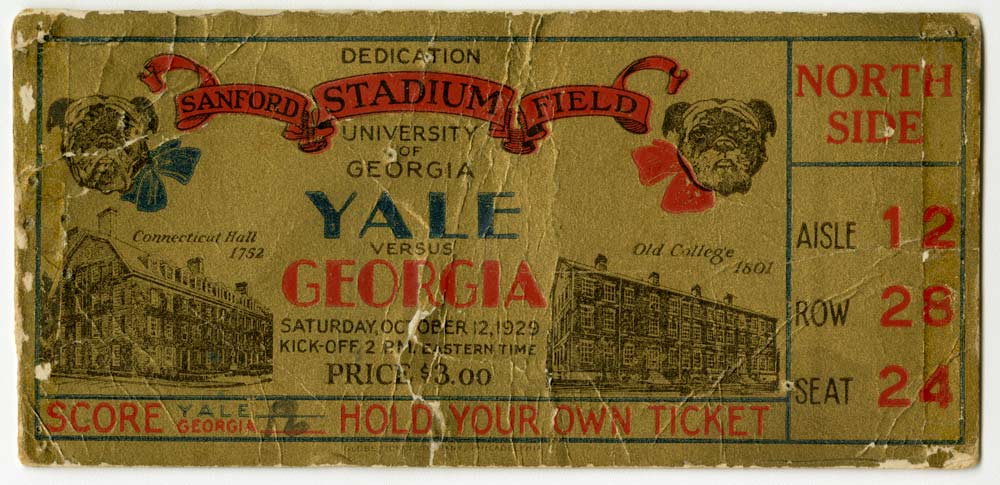
Date: October 12, 1929
Price: $3
Score: 0-15 (W)
2. 1931: Georgia Tech vs Georgia

Date: November 28, 1931
Price: $3
Score: 6-35 (W)
3. 1942 National Championship: UCLA vs Georgia
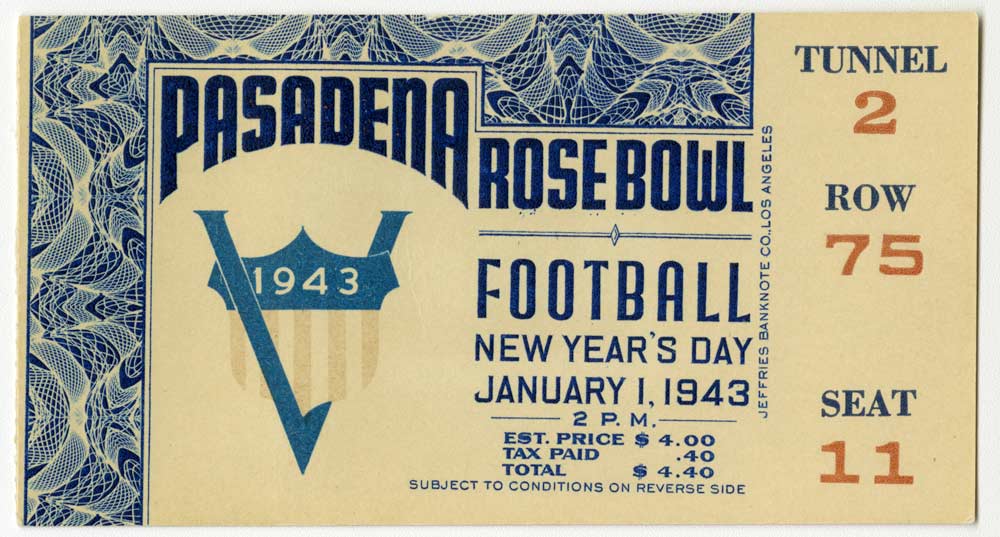
Date: January 1, 1943
Price: $4.40
Score: 0-9 (W)
4. 1963: Alabama vs Georgia
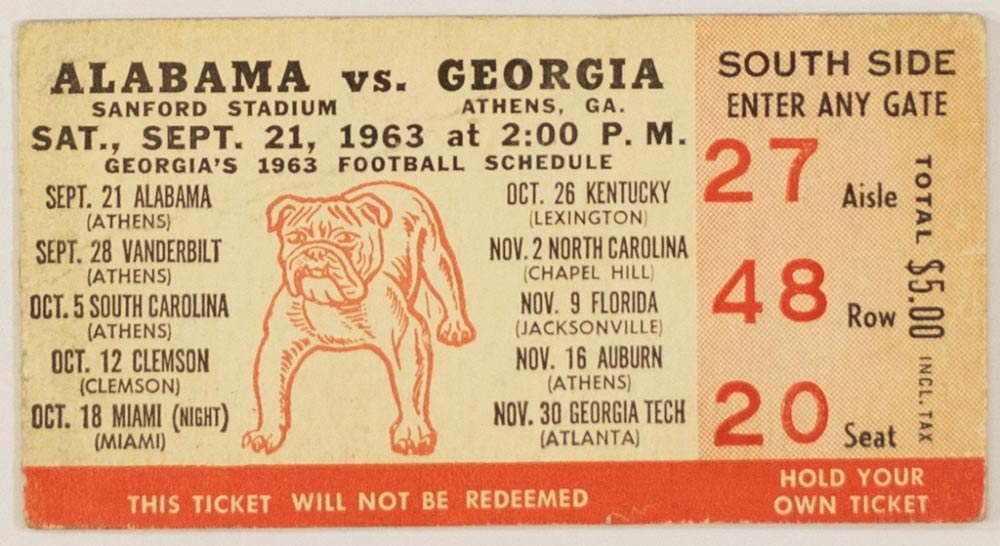
Date: September 21, 1963
Price: $5
Score: 32-7 (L)
5. 1966: Ole Miss vs Georgia
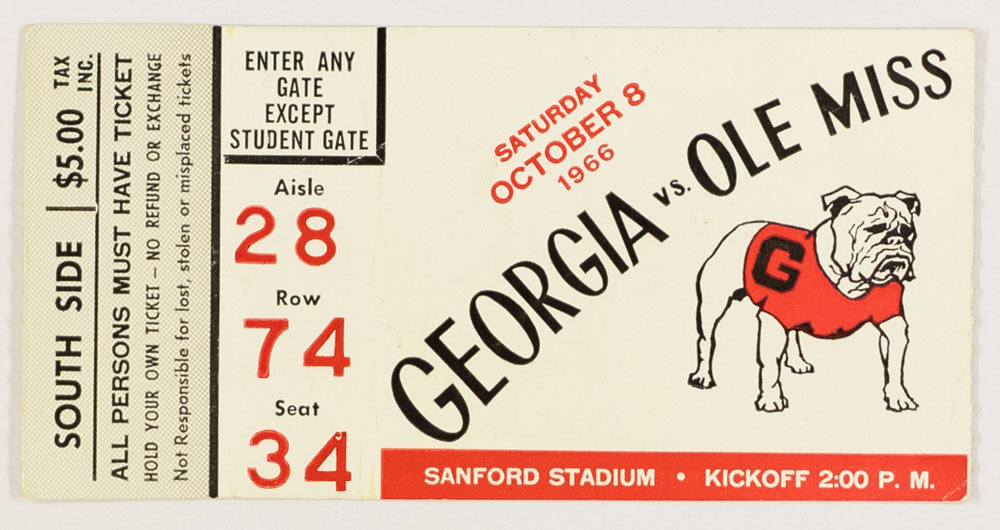
Date: October 8, 1966
Price: $5
Score: 3-9 (W)
6. 1971: Oregon State vs Georgia
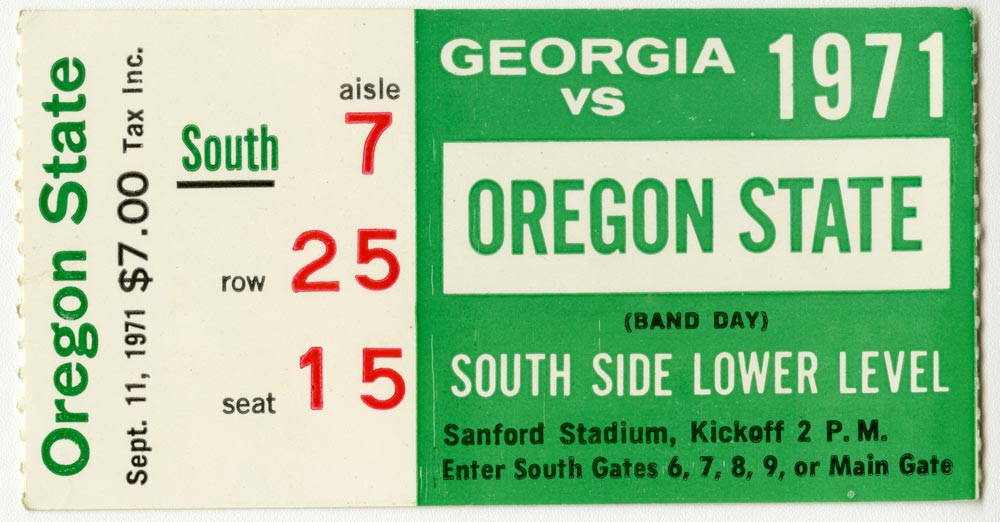
Date: September 11, 1971
Price: $7
Score: 25-56 (W)
7. 1980: Vanderbilt vs Georgia
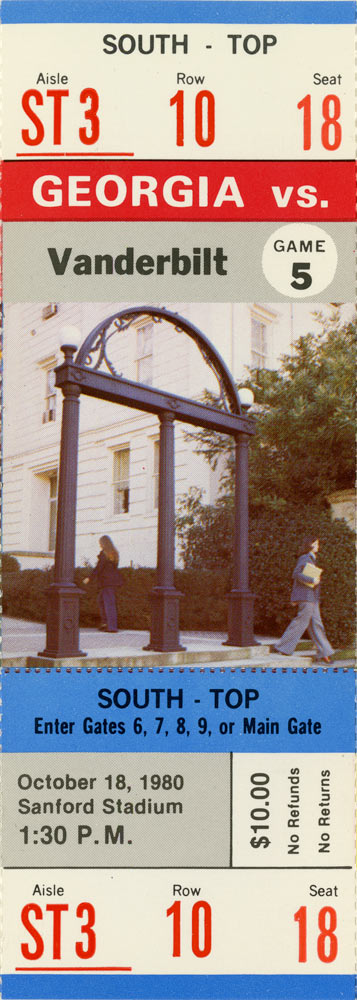
Date: October 18, 1980
Price: $10
Score: 0-41 (W)
8. 1980 National Championship: Notre Dame vs Georgia

Date: January 1, 1981
Price: $17
Score: 10-17 (W)
9. 1997: Mississippi State vs Georgia
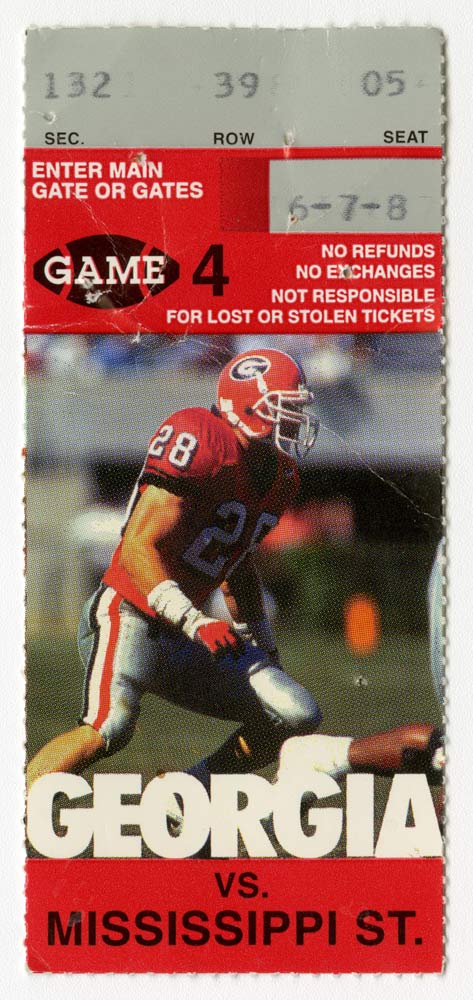
Date: October 4, 1997
Price: Unknown
Score: 0-47 (W)
10. 2008: Georgia Tech vs Georgia
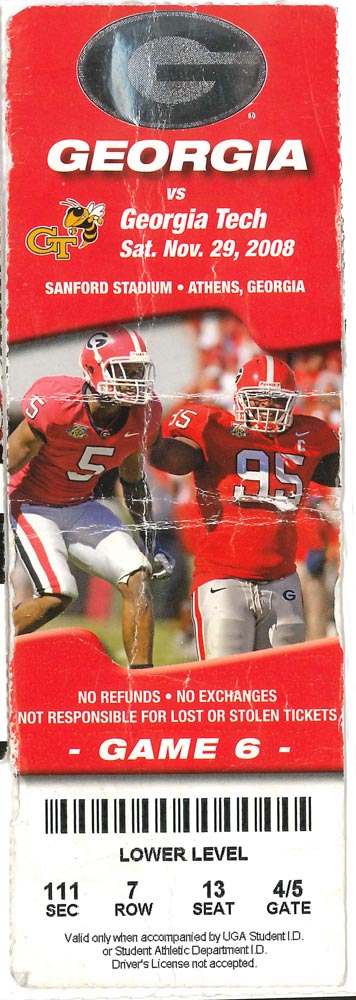
Date: November 29, 2008
Price: Unknown
Score: 45-42 (L)
11. 2019: Notre Dame vs Georgia
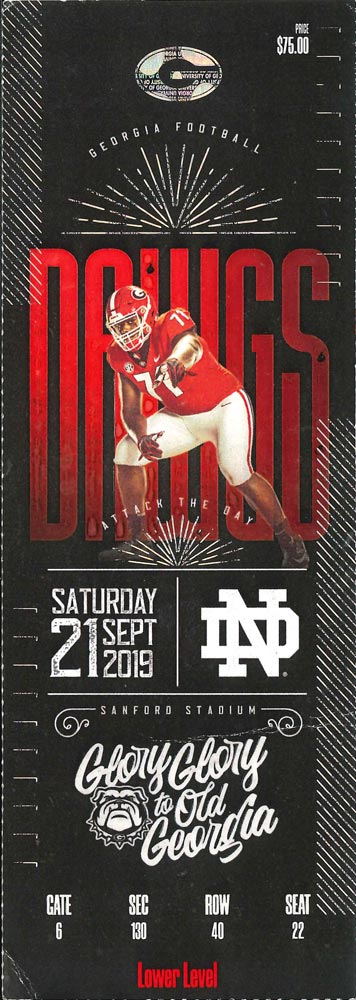
Date: September 21, 2019
Price: $75
Score: 17-23 (W)
Special thanks to the Hargrett Rare Book & Manuscript Library for helping us track down many of these ticket images. Be sure to check out “Beautiful and Brutal: Georgia Football, 2017” on display each Friday before home football games at the Richard B. Russell Building Special Collections Libraries.
We hope to see you in Athens for Homecoming 2019. Learn more about school/college events, including the annual Black Alumni Homecoming Tailgate, at alumni.uga.edu/athletics.
From one boss to another
The value of a high-quality boss can’t be overstated. From advocate, counselor, teacher and friend–a great boss wears many hats!
In honor of National Boss’s Day today, we asked some of our young alumni volunteers to share memories and lessons learned from their favorite bosses. Take a peek at their answers below … and remember to thank your boss(es) today!
Raj Shah (BSA ’06, MPA ’06, JD ’10)
Title: Senior Regulatory Attorney, MagMutual
Favorite Boss: Jon Rue, Parker Hudson Rainer & Dobbs
“Jon is the consummate professional and is extremely well-respected for both his professional achievements and community involvement. He taught me the importance of always finding time to listen, how to be actively present, and that humor is key to succeeding in the workplace.”
Jasmin N. Severino Hernandez (AB ’13, AB ’13)
Outreach Chair, UGA Young Alumni Leadership Council
Title: Associate Attorney, Davis, Matthews & Quigley, P.C.
Favorite Boss: Kevin Bowen, American Campus Communities
“Kevin took a chance on me when I was a new student at UGA who needed a job to make ends meet. Some of my favorite memories of Kevin include: tailgating for UGA games; when he made me work the leasing office during the ‘snowpocalypse’ of 2011 because I was the only employee snowed in on the property; and grabbing Firehouse Subs with him and his son Tyler. Kevin was a great friend and he taught me to be bold and stand for truth.”
[Jasmin and Kevin at one of their UGA tailgates, pictured top of page]
Hunter Knowles (JD ’12)
UGA Young Alumni Leadership Council
Title: Corporate Counsel and Assistant Secretary, Oxford Industries
Favorite Boss: Anonymous Law Firm Partner
“When asked if a more casual dress code could be implemented to match the attire of our clients, the partner responded ‘If our clients were the circus, would we dress like clowns?’”
Collier Hatchett Collier (BSED ’10, AB ’10)
UGA Young Alumni Leadership Council
Title: Director of State Board Operations, Technical College System of Georgia
Favorite Boss: Matt Arthur (BSED ’83, MED ’91), Technical College System of Georgia
“Matt and I are both graduates of the UGA College of Education and my favorite memory together is attending the 2018 awards ceremony where he received the COE Lifetime Achievement Award. Matt has taught me that it is never too late to show someone kindness and that becoming a good listener will allow you to understand others and help you become better at what you do. Plus, Matt also played on the 1980 National Championship football team (I have a pretty cool boss).”
Noel Hardin (BBA ’15, MACC ’16)
UGA Young Alumni Leadership Council
Title: Mergers and Acquisitions Senior Consultant, Deloitte
Favorite Boss: Travis Grody, Deloitte
“Travis and I started our careers in Audit at Deloitte. The most important thing he taught me was to take ownership of the quality of my work. Your brand is based on the quality of whatever you deliver. My favorite memory of Travis actually happened out of the office. A common trend for auditors during ‘busy season’ is to fall out of their exercise routines and gain 10-20 pounds (very similar to the ‘Freshman 15’). We spent a month traveling for a project in Toccoa, Georgia. Travis was getting married soon after our time in Toccoa, so he couldn’t afford to gain busy season weight right before his wedding. Toccoa is a very small town, but we found a gym online. We went the first morning before work, and the two of us worked out in the sketchiest old warehouse/gym you can imagine, with the sketchiest trainer you can imagine … and never went back. We found a different gym, had a great month in Toccoa, and Travis stayed in shape for his wedding!”
Even if you aren’t a boss, you can still help guide a fellow Bulldog’s professional journey – become a UGA Mentor today! You’ll be able to connect with a student who is seeking career advice on your time, on your schedule.
$1.5 million gift to Odum School of Ecology honors legacy of ecology student John Spencer
Article written by Beth Gavrilles (MFA ’89)
John Spencer, a master’s student in ecology at the University of Georgia, was passionate about freshwater ecology, conservation and ecological restoration. A graduate fellowship established through a $1.5 million commitment from John’s mother and stepfather, Kathelen (JD ’82) and Dan Amos (BBA ’73), is ensuring that his legacy will reach far into the future.
“Kathelen and Dan Amos are two of the most generous and devoted alumni of the University,” said President Jere W. Morehead. “Their establishment of the John K. Spencer Fellowship is a meaningful tribute to John that will help advance the important work he intended to carry out.”
John Spencer arrived at UGA in the fall of 2014 and immediately distinguished himself at the Odum School of Ecology for his hard work, ready laugh, enthusiasm and, most of all, his thoughtfulness. He cared deeply about people and the natural world. His untimely death in 2016 left his family, friends and colleagues devastated.
“John’s memory is with us every day—his smile, his optimism and passion for life,” said John L. Gittleman, dean of the Odum School and UGA Foundation Professor in Ecology. “John wanted us all to enjoy and conserve the natural world around us. This gracious and kind gift will ensure that future generations will have the chance to fulfill John’s passion.”
John’s research focused on the health of urban streams.
“John wanted to study—and positively affect—how stream ecosystems respond to stressors associated with watershed land-use change, particularly urbanization,” said professor Amy Rosemond, who co-advised John with assistant professor Seth Wenger.
John studied the effects of elevated conductivity—the amount of dissolved ions, or pollutants, in water—on invertebrate communities in urban streams as a way to measure stream health. In December 2016, the University of Georgia awarded him a posthumous master’s degree in recognition of the work he had completed toward the requirements of his degree.
The John K. Spencer Fellowship was established that year with an initial gift from John’s family and contributions from more than 370 friends, classmates and colleagues. The two-year fellowship provides a research assistantship to students in the master’s in ecology or conservation ecology and sustainable development degree programs who are interested in pursuing careers in management and conservation of aquatic ecosystems.
To date, three students have received Spencer Fellowships, and their work is already having an impact. Inaugural Spencer Fellow Emily Johnson built upon the foundation of John’s research to identify particular disturbances impacting water quality in Athens-area streams and create a real-time monitoring system that makes it easy for municipal water managers to respond to issues quickly.
Zach Butler is studying the impacts of an invasive species, the nine-banded armadillo, on the ecosystems and native wildlife of the Georgia barrier islands. Zach’s research has upturned the conventional wisdom about this species, finding that they are helping to fill part of the ecological role of the gopher tortoise, a native species in decline across the Southeast. His findings are now informing coastal ecological management plans.
Talia Levine is studying contaminant levels in fish found in the Turtle Brunswick River Estuary near a Superfund site on the Georgia coast. She is measuring PCB and mercury concentrations in whole fish because, while fish consumption guidelines for the area exist, they are based on filleted samples only, and there is evidence suggesting community residents use more of the fish than just the fillets. Talia is sharing what she learns with government agencies and nonprofit organizations in the Brunswick area to support them as they work to ensure safe consumption of seafood resources by community residents.
“The John K. Spencer Graduate Fellowship honors John by providing our outstanding graduate students the opportunity to pursue careers in aquatic conservation and management and make a positive difference, as John intended to do,” said Gittleman. “This gift ensures the continuation of John’s legacy, for which we are immensely grateful.”
The Jerry Tanner Show, Episode 6 – South Carolina
Bob Sleppy (BS ’05, MBA ’10) makes a difference at Nuçi’s Space
Bob Sleppy (BS ’05, MBA ’10) is the executive director of Nuçi’s Space, an Athens, Georgia, nonprofit that allows musicians to meet with doctors about physical and/or mental health issues.
For World Mental Health Day today (October 10), we asked Bob to share a little about Nuçi’s Space, his UGA experience, and how attitudes toward mental health issues have evolved over the two decades since Nuçi’s Space first opened its doors.
How does Nuçi’s Space serve the Athens community?
Nuçi’s Space was created in memory of 22-year-old UGA student and talented musician, Nuçi Phillips, who was diagnosed with clinical depression in high school. Although he fought courageously, Nuçi sadly lost his battle, and on Thanksgiving Day 1996, he ended his life.
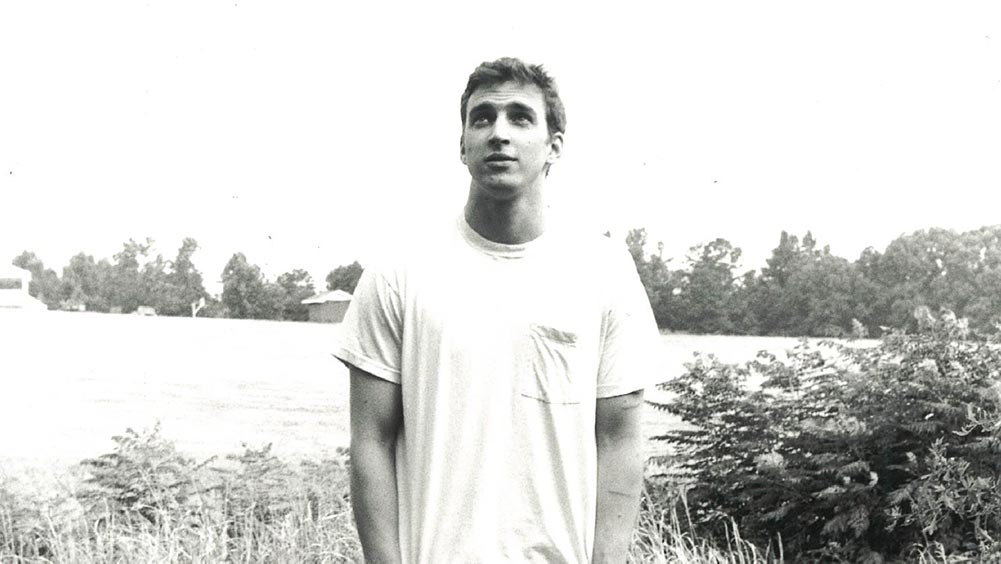
Nuçi Phillips
Nuçi’s Space is a 501(c)(3) nonprofit organization whose mission is to prevent suicide by actively supporting the emotional, physical, and professional well-being of musicians. Nuçi’s Space advocates for and helps to alleviate the suffering of those living with a brain illness while also fighting to end the stigma attached to such illnesses. To accomplish this mission, Nuçi’s Space provides a healthy, safe environment in which musicians are supported and guided to affordable, obstacle-free appropriate professional care. While appropriate treatment of brain illnesses is crucial, Nuçi’s Space also recognizes and strives to heighten awareness in order to help to identify preventive tools, including how individuals can maintain healthy lifestyles.
Since its inception, Nuçis’ Space has financially assisted 2,000+ musicians, subsidized 23,000+ appointments with mental health professionals, at a cost of over $1.2 million.
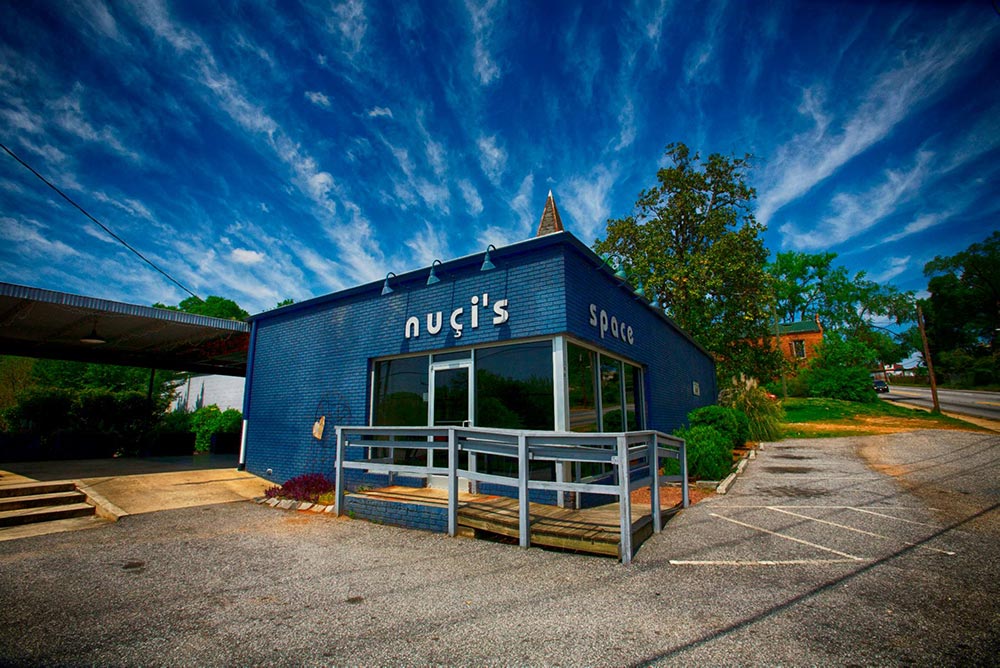
Nuçi’s Space
Describe your biggest challenge as executive director of Nuçi’s Space.
I don’t know if there is just one challenge that stands out from the others. The challenge is finding balance among all the roles and responsibilities that come with the job. I’ve found that the best way to overcome this challenge is to hire great people and lean on them to help navigate the daily ups-and-downs of managing a nonprofit organization.
How does Nuçi’s Space collaborate with UGA?
Our collaboration with UGA and its students is almost too extensive to share in its entirety. In addition to the students who volunteer with us, we regularly work with the Music Business Program, AU/UGA Medical Partnership, Institute for Nonprofit Management and Leadership, School of Social Work, Student Health Center and the UGA Police Department. The University of Georgia has been a terrific partner in our growth and we continue to look for new and exciting ways to collaborate.
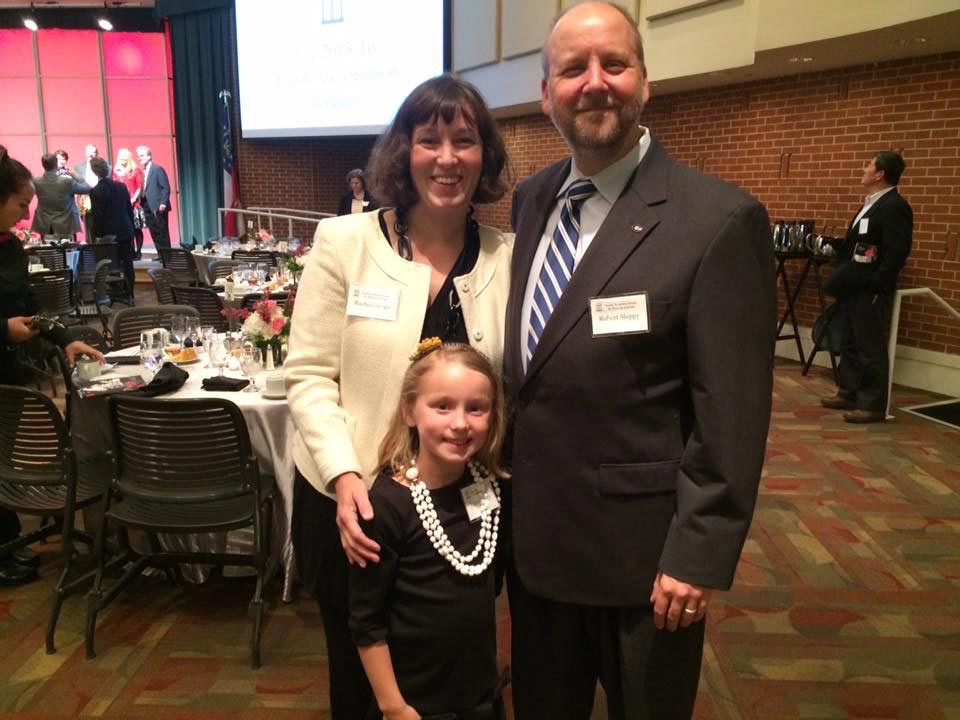
Bob with his family at the 2016 Teacher of the Year Banquet where he received that year’s honor.
How has your UGA education prepared you for this role?
In addition to the high caliber of professors, fellow students and endless learning opportunities, the attribute that really makes the University of Georgia stand out is its commitment to service learning and community engagement. The opportunity to apply the lessons learned in the classroom to real-world situations is unparalleled.
How has the community perception of mental health evolved since you started at Nuçi’s Space?
I was hired as the executive director in 1999. Fortunately, I have seen some improvement in how depression and suicide are perceived by the public. Most of the stigma related to mental illness can be attributed to a lack of understanding and misinformation. The more we talk about mental illness, share our personal stories and feel empathy for each other, opportunities to lessen the stigma will occur. This weekend, during the third quarter of the UGA vs. South Carolina football game, the crowd will be asked to hold up three fingers in remembrance of Tyler Hilinski, the brother of South Carolina’s quarterback Ryan Hilinski. Tyler lost his battle with mental illness when he took his own life in 2018. Twenty years ago, I couldn’t have imagined that 92,746 football fans would pause for a moment to honor those we’ve lost or who continue to suffer with a mental illness.
Did you have a favorite professor?
I had great professors and lecturers throughout my undergraduate and graduate programs. My experience as a student in the Terry Part-time MBA Program was beyond what I could have hoped for. Some of the professors who come to mind are Dr. Ann Buchholtz, Dr. Dwight Lee, Charles Lankau III, and Dr. Bob Boehmer. However, I attribute a good portion of my professional success to Dr. David Harvey. His financial accounting class was very challenging, but it solidified the work ethic my parents instilled in me when I was younger. I have such a profound respect for Dr. Harvey and was delighted when he accepted a position on the Nuçi’s Space Board of Directors earlier this year, nearly 12 years after I attended my first class with him.
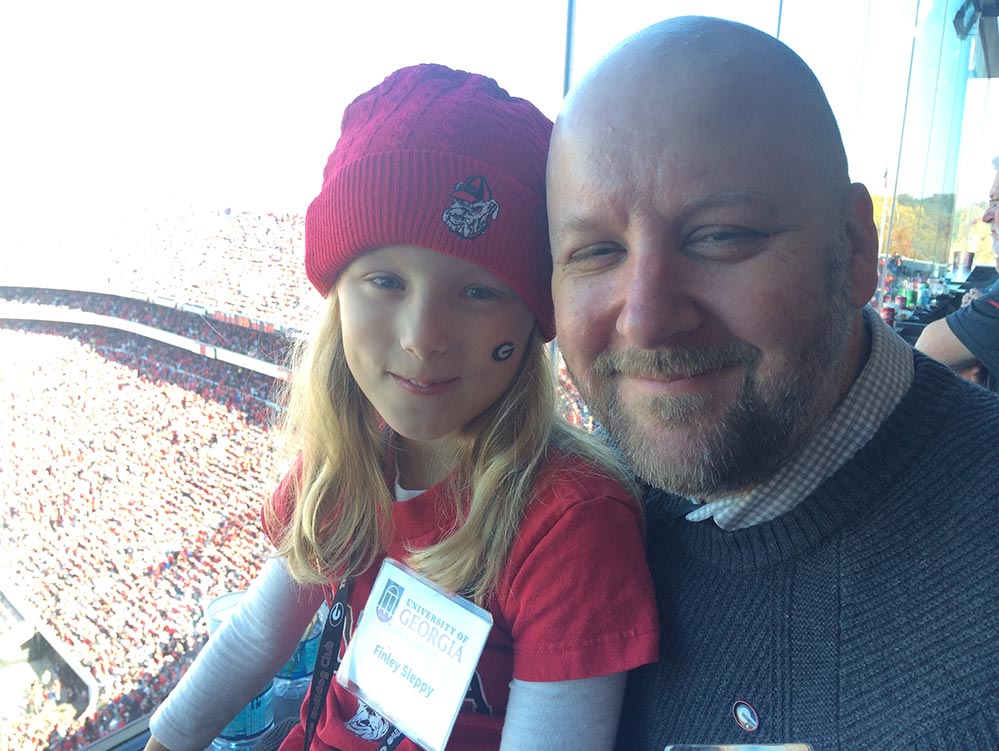
Bob and his daughter, Finley, take in a Georgia game at Sanford Stadium.
What is your favorite part of teaching?
I have been fortunate to teach Theory and Management of Nonprofit Organizations, Social Entrepreneurship and Nonprofit Leadership through the Institute for Nonprofit Management and Leadership at the UGA School of Social Work for the past 8 years. My favorite part of teaching are the ongoing relationships I have with students. I try to incorporate a Socratic style of teaching so that we discover, analyze, discuss and solve problems in the classroom together. Often my interaction with students extends beyond graduation. I receive occasional emails from former students who stay in contact with me. I love watching them transition from students into colleagues.
Has teaching enhanced your ability to perform your role at Nuçi’s Space?
Absolutely. The blessing and curse of teaching very smart students is that they keep me on my toes. My responsibility as an instructor to stay current on trends and best practices in the nonprofit sector directly impacts my role as an executive director.
Most meaningful experience at Nuçi’s Space?
I have so many great experiences at Nuçi’s Space that it’s impossible to choose just one. One of my proudest moments was when my work at Nuçi’s Space and my involvement with UGA coincided. Nuçi’s Space has been recognized four times (2012,2013, 2015, 2016) as a Bulldog 100 business, recognizing the 100 fastest growing businesses owned or run by an alumnus.
The Jerry Tanner Show, Episode 5 – Tennessee
Mallory O’Brien (ABJ ’12) and the secret to a soapy success
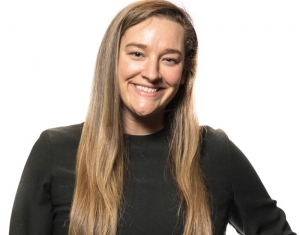
Mallory O’Brien is a UGA alumna and the brain behind Irish Spring’s Twitter account. Photo: Peter Frey
While the Bulldogs earned a “W” versus Notre Dame last month, one surprising brand also took home a marketing ‘win.’ Irish Spring, a popular soap line, enjoyed 15 minutes of internet fame thanks to an idea from Mallory O’Brien (ABJ ’12), the co-vice president for the NYC Dawgs and a social media community manager at Colgate-Palmolive, Irish Spring’s corporate parent.
After Georgia-based grocery chain Dill’s Food City announced in a now-viral post that it wouldn’t sell Irish Spring prior to the game against the Fighting Irish, Mallory had some great ideas that led to the brand reacting accordingly.
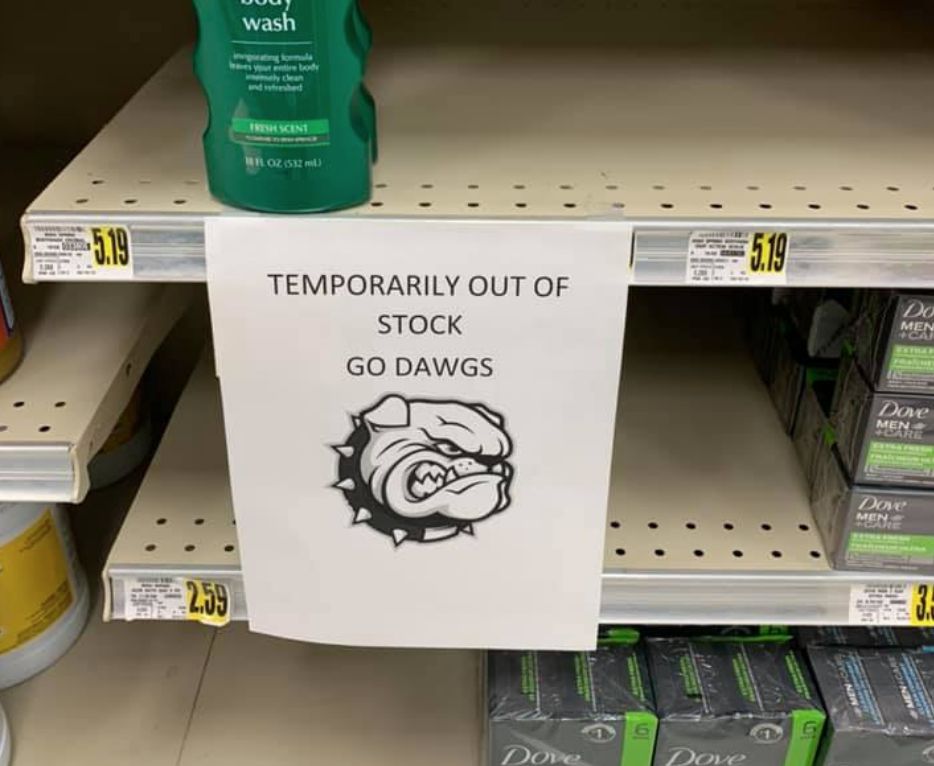
A photo from the Dill City Food Facebook post that went viral.
Though there had never been a reason for Irish Spring to need a Twitter presence, this turned into the perfect opportunity to start a social media storm. Now verified with over 3,000 followers, the account has been an immediate success.
In Irish Spring’s second tweet ever, the brand poked fun at the grocery store and claimed they were about to send a whole lot of soap to Athens. This gained almost 3,000 retweets and over 16,000 likes.
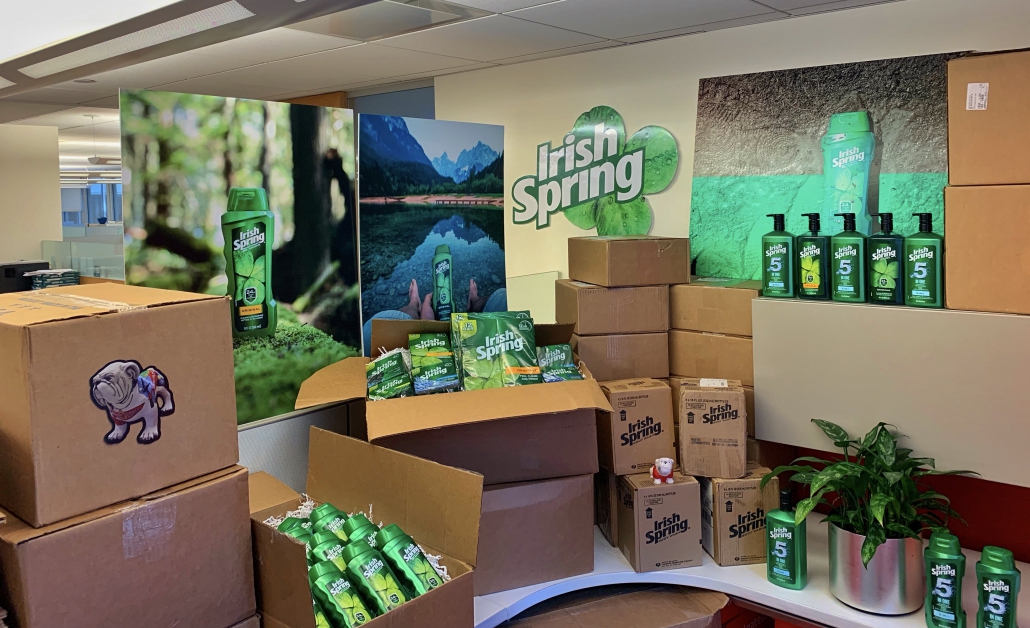
Irish Springs sent quite a few packages to Athens. Photo via Irish Springs Twitter.
Irish Spring jumped head-first into the social media space, but followed only four accounts–the University of Georgia being one of them. But this wasn’t the brand’s only impact on the internet. Mallory suggested sending brand ambassadors to campus for that glorious–and crowded–football Saturday in Athens.
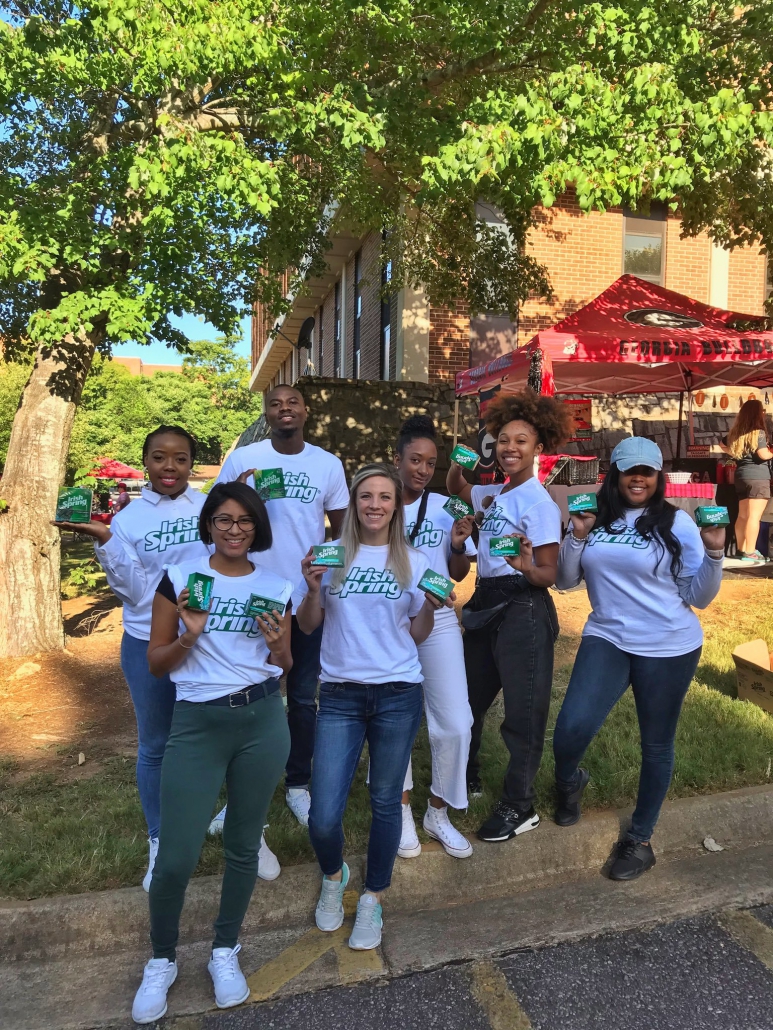
Campus ambassadors for Irish Spring visited Athens with gifts. Photo via Irish Spring’s Twitter.
Who would have anticipated that a Bulldog was behind this campaign from ‘up north?’ Surprising as it may be, we know that all great things start at the University of Georgia.
Here’s to good, clean fun and a Georgia win!
Show off your red and black in style thanks to artist Melissa Mahoney (BFA ’87)
This article was written by Leigh Raynor Arndt.
All Bulldogs know that Saturdays in Athens are not for sweatpants. For those seeking a more refined gameday look, alumna Melissa Mahoney (BFA ’87) has designed a particularly stylish way to don your red and black. Her beautiful silk scarves have landed in the UGA Bookstore and embody Melissa’s love for her alma mater. The scarves’ combined artistry and practicality reflect the story of Melissa’s career–a path she began as a UGA student.
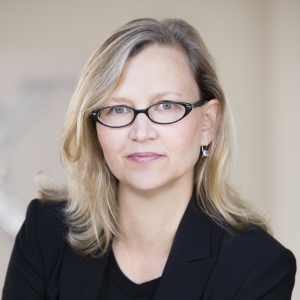
Portrait of Melissa Mahoney (BFA ’87)
With several artists in her family, Melissa comes by her creative streak honestly. An Atlanta native, she now lives in Palo Alto, California. She’s led her own graphic design firm, Indigo Creative, since 1993. The success of her business now allows her to spend more time on another passion: painting.
Melissa’s scarf design uses high-energy swirls that run throughout her latest “Vortices” series, which is a collection of paintings and textiles. In addition to designing for UGA, she’s created scarves for Stanford and tech-juggernaut Google. And she’s been her own boss for more than 25 years. She attributes much of this success to the knowledge and skills she gained at UGA.
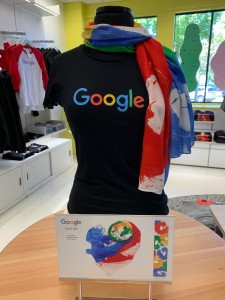
The Google scarf Melissa designed.
Melissa’s graphic design major and fine arts minor gave her practical know-how while allowing her to explore her artistic side. “Not all graphic designers can draw and paint, but these are great skills to have,” said Melissa. “They have helped me stand out in my field.”
After graduation, Melissa pursued graduate studies through UGA Cortona, a program that just celebrated its 50th anniversary. In Italy, Melissa was inspired by seeing in person the art that she’d studied for years. The trip also emboldened her. “Going to Italy gave me the courage to try new things and venture out,” said Melissa. Ultimately, her experience abroad led her to follow her dream of living in California.
After a few years working in Atlanta, Melissa packed up her belongings and drove across the country to the West Coast. With no job offer in tow, the move was risky. But the reward for her bravery has been a long career in California, the state that now “feels like home.”
Melissa continues to exhibit the courage she developed at UGA. A cold call and months of determination led to her Google scarf. A scarf for another tech giant will soon be on the way, too.
“There are so many ways to make a living as an artist,” Melissa said. “I’m lucky to do what I love. And I love sharing my passion. Seeing others enjoy my art brings me so much joy.”
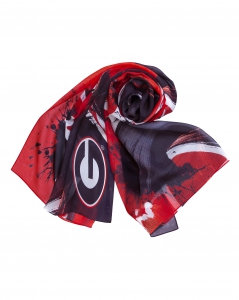
Melissa’s UGA scarf and more will be available at her pop-up shop at the UGA Bookstore in November.
Visit Melissa in Athens on November 22 and 23 for a “Scarf Pop-up” at the UGA Bookstore! Learn more.
And on Sunday, October 20, San Francisco Bulldogs can let their creative side loose during a workshop Melissa will lead at the Triton Museum of Art in Santa Clara.


